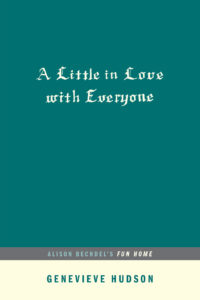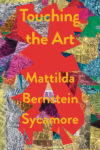The following is an excerpt from A Little in Love with Everyone by Genevieve Hudson (Fiction Advocate, 2017), published with permission of Fiction Advocate.
 The College of Charleston in South Carolina runs a voluntary summer reading program called “College Reads!” Faculty and first-year students are given copies of the same book and asked to read it before school starts in the fall. The goal is to bring students together around a common reading experience, encourage critical thinking, and shed light into a corner of culture students might not have previously explored. In 2013, the assigned book was Fun Home.
The College of Charleston in South Carolina runs a voluntary summer reading program called “College Reads!” Faculty and first-year students are given copies of the same book and asked to read it before school starts in the fall. The goal is to bring students together around a common reading experience, encourage critical thinking, and shed light into a corner of culture students might not have previously explored. In 2013, the assigned book was Fun Home.
I doubt they understood the firestorm it would bring.
It started with a concerned parent who believed that assigning Fun Home for an academic class was inappropriate. It didn’t take long for Republican South Carolina lawmakers to grab their pitchforks and move into action. Many lawmakers felt the graphic memoir was problematic—that it promoted a lesbian lifestyle and could even be considered pornographic (perhaps referring to the panels where Bechdel writes and draws about her experience with other women). Legislators wanted retribution. The college would be punished for assigning a queer text. Representative Gary Smith told a South Carolina newspaper: “if you want to make a point, you have to make it hurt.”
To make it hurt, Republican lawmakers proposed a budget cut of over $52,000 in state funding to the College of Charleston. Not coincidentally, this was the same amount of money the university paid for the books. A similar budget cut of $17,142 targeted another South Carolina state school that had assigned Out Loud: The Best of Rainbow Radio, a book that documented the state’s first gay and lesbian radio show.
Many people at the college were outraged that the state government would try to control what books were assigned by taking away school funding. This kind of censorship isn’t necessarily appealing to prospective students or faculty members who value their academic freedom.
In response to the attempt at censorship, Fun Home’s original off-Broadway cast came down to the college and performed a concert-style version of the musical. This act of solidarity and outreach provided a kind of silver lining for the students at the college, especially queer students who felt particularly vulnerable and attacked by the lawmaker’s vitriol.
South Carolina Upstate, the other state school that faced budget cuts for assigning a gay-themed book, did not let the threat of slashed funding censor or deter them. About a month after the proposed cuts, the school held a symposium called Bodies of Knowledge that discussed several queer themes. One of the performances, a comedy about coming out, was titled “How to be a lesbian in 10 days or less.”
In response, S.C. Senator Kevin Bryant said: “If they’ve got extra money sitting around to promote perversion, obviously they’ve got more money than they really need.”
The College of Charleston isn’t the only place where Fun Home has caused a backlash and faced the threat of being banned. In 2008, at the University of Utah, one student balked at the book’s content when it was assigned to their English class. The student was given another book to read but made sure to tell the local Salt Lake City group “No More Pornography” that their English class was using Fun Home in its syllabus. At Duke University, Fun Home was assigned for a voluntary summer reading program much like the College of Charleston’s. A small group of students protested the book, saying it conflicted with their religious and moral beliefs. After finishing a literature course on Fun Home, one student at Crafton Hills College in Yucaipa, California, listed it as one of four other graphic novels that should be “eradicated from the system.” In Marshall, Missouri, a woman asked that Fun Home—along with the graphic novel Blankets by Craig Thomas—be removed from the local public library. She described Fun Home as pornographic and thought that young children might be attracted to its aesthetic only to discover the illicit content inside. A concerned citizen, she worried that the existence of such a book in the public library could draw in an unwelcome crowd of “seedy” people.
“I feel as if I would have to compromise my personal Christian moral beliefs to read it,” said a Facebook post from an incoming freshman at Duke University who was assigned Fun Home.
Apparently, people are really scared of a good, queer counter-narrative.
College of Charleston is my alma mater. Though I graduated before the misfortune over Fun Home, I watched in sadness from my new perch on the west coast as homophobes came out of the woodwork to roost. There it was: proof of how frightened people are of queerness.
Our emotions are forever connected to the act of fucking. Our stories are pornographic. Our lives are something to censor.
Should I have been surprised? All I know is it felt personal when the place that ushered me into my queerness doubled back with a public rejection of my identity. I knew the South was steeped in a particular kind of oppression, but when I lived in Charleston, I had been part of a thriving queer subculture. I think it made me a little soft, a little naïve, a little stupid to the reality of things. I let down my guard. I felt safe. Wholly and completely safe.
That’s my youth talking. That’s my privilege of class and race and access talking. Many people in the South never get the chance to step outside of the closet. But I had that chance, and it had made me believe that maybe things were changing.
Charleston is the city that showed me how to be gay. The city that seemed, at one point, to be a free education in how to kiss girls, date girls, and fall in love with girls. I would walk down Tradd Street, past the million dollar colonial homes on the Battery, holding hands with my lover, pushing each other against telephone poles like were about to fight or fuck. When I close my eyes, I can smell the horse shit and the sunbaked pavement and the ocean and the sweat that covered everyone’s body all the time. I feel a hot sun burning my shoulders. Someone once said to me that the South in the summer is like stepping into a dog’s mouth. All heat and teeth and sweat.
Charleston is the where I encountered queer literature and started building my queer archive. It is the city where I first read Anais Nin’s diaries and bell hooks’ essays and Simone de Beauvoir’s novels and heard the name Audre Lorde. Why didn’t those get banned? Was it because they were hidden away in the dusty corners of women’s studies classrooms? Was it because the discourse would remain bracketed, caught inside itself, a kind of speaking to the choir? Was it because the crime is not that stories of queerness exist but that we make those stories visible to the greater world?
Charleston is where my identity moved from the mind into the body, where I sat outside on a sticky spring night and listened to C, a girl from poetry class, tell me how she and her best friend in high school would make out for hours. She wasn’t a lesbian. It was just something they did. C always seemed sad and I wondered if kissing her friend made the sadness better, if only for a moment. I hoped she would kiss me and show me how it felt to make out with a girl for hours. But she never did. I lay in bed and wished on those plastic stars that she would look at me, just once, the way my boyfriend did.
R worked as a barista in the coffee shop I went to almost every day. There is an absolute truth to the exact hour and day when I opened the door to the café and saw her. She looked at me in a way that made me feel like I was about to change her life. She looked at everyone like that, like they had the power to break her heart. But she was about to break theirs. I ordered something but she talked me into ordering something else because it was her favorite. It seemed like I could be her favorite, too. She put cream in her iced coffee. And honey. She sipped it down to nothing. She rattled the ice and sucked at the straw and stared at me.
You can tell a lot about a person by the way they hand you money, she said.
I looked down at my outstretched hand filled with sweaty, rumpled bills. Coins were scattered on the counter. I was a mess. We laughed. She laughed. She threw her head back and laughed in a way that scared me.
The next time I saw her, she told me her ex-girlfriend punched her in the face and gave her a black eye. Ex-girlfriend? I didn’t know what to be more excited about: the fact that she had an ex-girlfriend or the fact that she wanted me to know she had an ex-girlfriend.
On morning, I stopped by for a tea before I went to hot yoga. I forgot it was a Sunday, so the café didn’t open until later. But I saw R’s bike, which she had named Dinosaur Flash, locked to parking meter outside. Music pushed through the thin windows and into the wet air around me. The door was unlocked so I opened it. R was dancing behind the counter with something like Taylor Swift turned up loud. Her dirty hair was flying around. I smiled at her body, spinning, her arms thrown up above her head so I could see the tattoo of her dog’s name on her ribcage. Then I noticed she wasn’t alone. There was another girl there. This girl had kohl-lined eyes and mascara on her cheeks. R and this girl were dancing and yelling to each other over the music about something that happened the night before. I could smell the tequila coming off their chests. I could smell their armpits.
R saw me and smiled. She yelled something like, Homeboy, it’s you!
We were in her friend’s car in the Whole Foods parking lot, sharing brightly colored organic candy and talking about all the people whose hearts she had shattered, when her face got serious.
I’m really attracted to you, she said. But you have a boyfriend.
Soon after that, I broke up with my boyfriend. My first night with R is marked in my memory. The air felt steaming, floral, laced with the sea. It was the kind of hot that made you forget cold could exist. The ocean was warm when you touched it. I was wearing a dress. She was wearing a dress, too. I had long hair. She had long hair, too. We were on the corner of George Street and St. Philips. We were outside her car. The first time I kissed another girl, she was older, and she was taller, and her lips were very thin. Her hands were in my long hair. I touched her tall body the way I would want my body to be touched. I leaned into her so she knew that I meant it. I imagined all the men she’d kissed. I couldn’t help it. She was more beautiful than I was. She was beautiful in a way that women who read magazines about how to apply makeup properly are beautiful. She was beautiful in a way that women who shop at thrift stores and eat nachos and dance on tables and drive to the beach alone at midnight are beautiful. The next time we kissed was in the same town on another street, and as we kissed an SUV full of college boys drove by and yelled, Lesbians!
She texted me: How’s it going, homeboy? One time she wrote: Homeboy, if I wasn’t so fucked up, I could fall in love with you.
R was the catalyst for everything. I remember not wanting to get out of her car. The dashboard glow felt like it could be our candlelight. The streetlamps might as well have been stars.
She threw a mason jar at me during a party and it broke into shards at my feet.
She looked into her own palm and told me she was an old soul.
She left me at midnight to go sleep with another girl but came back long enough for us to kiss in the hot moonlight in the middle of the street.
She told me she was moving to Korea.
She told me she had recently been engaged.
She told me the woman she loved moved to Hawaii for another woman.
She told me her best friend was in love with her but that all she wanted was me.
She told me she needed to wash the vodka out of her hair.
She named my bicycle Mango.
She told me she was going back to men.
She told me her soul mate lived in England.
She told me she had given her egg to another woman so she could get pregnant.
She told me all relationships with women are all-consuming and doomed to fail.
She told me as many lies as I would believe.
She told me she would never be some girl’s first.
But she was my first.
To get over R, my friend B invited me to her apartment. We meditated for two hours. Did we both open our eyes at the exact same time, or had I been waiting for her to come back to consciousness? B took a vow of silence, and I sat with her on her outdoor furniture and stared into the street. Occasionally we looked at each other and smiled. During these days, I did a lot of waiting for the pain inside me to stop.
There was no one to talk to about what I was going through. The only thing that seemed to know anything was books. In books, everything seemed to have happened to everybody already. There was peace in that, a kind of solidarity. Literature holds power. I have always been amazed at a writer’s thrilling ability to observe or articulate a feeling I had previously thought was specific only to me. It’s a kind of magical empathy. It makes me feel less alone.
Some of my straight friends would listen to me as I was coming out. I had a compulsion to give words to my experience. I was obsessed and consumed.
I can totally imagine wanting to kiss a girl, one friend said. But I would never want to go down on one. She crinkled her face, disgusted by the thought.
We walked past magnolia, wild roses, blue haw, bear grass, black-eyed Susans, leather flowers, sweet-grass, azalea, sage, butterfly weed, pepperbush, and beauty-berries. Charleston is a place where things grow. Mold grew in our bathrooms. Ferns grew up the sides of our fences. Hair grew on our legs and under our arms. Racism grew out in the open, where everyone could see it, even as the tour guides walking through old slave markets talked about how much had been overcome.
The South can talk in words like redemption because the South is a religious place where people believe in resurrection and second chances and blind faith and goodwill. There is right and wrong. There is purity and perversion.
I would drive to the beach to kill time, the sky electric blue, so blue it made the ocean look black. I would sit in the blonde grass and watch the blonde girls walk right into the water. I would open a book and read. Wherever I was, I could go somewhere else. I entered my books and disappeared into a stranger’s life. I slipped into a second skin. I was privy to conversations about gender and sex and desire that I longed to be having. It was almost like I was part of the conversations myself. Reading was not an escape from life. Reading let me access life outside of my physical reality. Through reading, I inhabited my life more completely.
When the moon rose and the sun set on the beach, I was in two places. Scorched, tired bodies drifted back to their cars. A few couples clustered on blankets to watch the ocean push and pull the sand. In my book, someone was falling in love for the first time.
Genevieve Hudson is a writer living in Amsterdam. Her work can be found in Catapult, Tin House online, Vol 1 Brooklyn, Joyland, No Tokens, The Rumpus, Bitch, and other places. Her writing has been supported by the Fulbright Program, Caldera Arts, and the Dickinson House.
This post may contain affiliate links.







